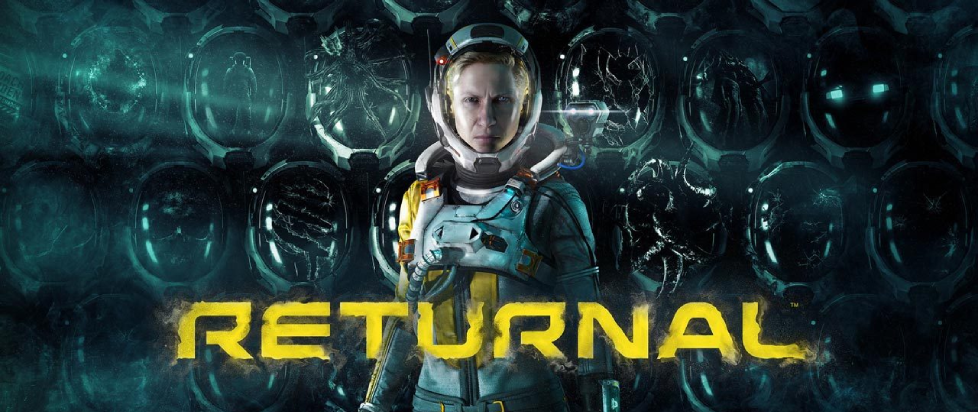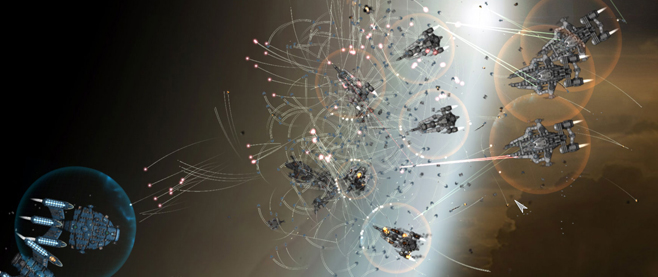
Returnal Pushes Against the Risks of Ambition
Helios Abandoned.
This warning flashes across the screen at the beginning of every run of Housemarque’s Returnal. As you charge Selene again into the alien world of Atropos, Returnal feels it’s important to remind you that you’re also leaving behind the ship on which you crashed, Helios. Atropos is a planet well beyond our solar system, so when you find Selene’s family home nestled in the planet’s tangled wilderness, the game demands that you look at its world and its story with a more metaphorical eye. If Atropos shouldn’t be interpreted so literally, maybe there’s more to “Helios Abandoned” than just leaving behind a ship.
We later learn that Helios is also the name of Selene’s child, and that Helios was lost in a car accident. As she crashed her car from a bridge and it sank into the water below, Selene escaped, but Helios did not. Helios Abandoned.
We plunge even deeper when we learn that Selene may not have been safe to drive when she had the accident. Undergoing some sort of procedure or receiving medication as part of her training to become an astronaut, she knew she wouldn’t be safe to drive, but she put her ambitions ahead of her child. There are hints of this pattern throughout the story beats of Returnal. The moment in which Selene is forced to abandon Helios within a sunken car is only the tragic culmination of a long sequence of events in which Helios struggles to gain Selene’s attention. With Selene’s all-encompassing ambition to become an astronaut, Helios was abandoned well before the crash.
There’s nothing inherently wrong with ambition. It can be an admirable characteristic that drives achievement and improvement. But it can come at a cost. Achieving anything requires an investment of time and energy, both of which are finite. Time spent fulfilling your ambitions is time that could have been spent with friends or family, or on yourself and your health. Left unchecked, ambition can drink every drop of that energy and consume every moment of your time. Any effort or second you spend doing anything other than working towards that ambition suddenly becomes a frustration, a waste, something to resent.

In his book Burnout Society, philosopher Byung-Chul Han puts forward the idea that we’re living in a society of excessive positivity. We look around us and see people being celebrated for having achieved amazing things, or being told that we can do anything if we just give it time and energy. This obviously has its merits, but it’s a world in which we’re compelled to use all our time productively; we become assets to be optimized. Downtime is a vice afforded only to those who are satisfied with being ordinary, or should only be used to recharge in an effort to achieve something more.
Again, spending one’s time in an endless pursuit of achieving something extraordinary is fine. Provided that you enjoy doing it, and that those around you aren’t being hurt in the process. When we read stories about “successful” people, we don’t often hear about what they’ve given up for that success.
In Returnal, Selene’s ambition to become an astronaut is made manifest as an Apollo-era astronaut who watches her every move silently from a distance. And the cost of this ambition is seen in the moments when we view the intimidating presence of the Astronaut from Helios’s perspective. In one pseudo-flashback sequence, Helios enters the family kitchen, where the Astronaut sits at the table, a book in hand. Helios tries to engage it in a fun, imagined story, but the Astronaut only responds with a cold, uninterested stare. For the Astronaut, and Selene’s ambition, Helios is a distraction from something more important. This engagement is a waste of time.
Trying to remove wasted time from your life can be an important means of finding an opportunity to do more of what you want to do. But for those whose ambitions are all-consuming, even day-to-day tasks which could be seen as essential, are reframed as wasteful. In Walden, Henry David Thoreau spends the best part of a chapter advocating for a minimalist lifestyle because cleaning your home takes too much time. If we’re obsessed with the exceptional, we become resentful of the mundane.
For Thoreau, mundanity might be a feather duster, but for ambition, it’s anything which takes away time from achieving something extraordinary. This might mean simplifying your life and home, but it could also mean avoiding spending time with our loved ones because those relationships don’t bring us any closer to our goals.
This tragic sentiment is illustrated in Returnal as Selene drives Helios in her car through the forest. When Helios tries to talk to Selene, she simply shoots him a look in the rearview mirror that is all at once bored, tired, and angry. Helios gets no response from Selene, because it doesn’t earn her anything to do so.
That Selene resents Helios because they’ve denied her ambition to become an astronaut, may mean that she’s already abandoned Helios – emotionally, at least. But the ultimate cost of this ambition is realized moments later as the Astronaut appears in the road ahead of the car. Selene swerves, crashing the car from the bridge and into the water below. As we already know, Selene escapes but abandons Helios. In one of the final cutscenes of the story, Selene re-lives this crash again, but this time she is the Astronaut standing in the road. As the car screams towards her and dives from the bridge, we realize that while the Astronaut may have been an exhaustion-induced hallucination, it was ultimately borne from her obsessive ambitions.

But ambition doesn’t have to do this. The pain of achieving these goals doesn’t have to exist if we enjoy the process of achieving them. I don’t want to say “it’s about the journey not the destination”, but maybe it is. We learn that Selene might be driving herself to be an astronaut not because she wants to, but because she’s living the life that her mother wanted to achieve before her mother had a car accident eerily similar to Selene’s. Whether from a sense of guilt, duty, or obligation, Selene adopted her mother’s ambition despite not necessarily wanting it.
Many of us do this too. We see what others achieve –their careers, salaries, fame, and we drive ourselves to do the same. We’re told that all it takes is the grit and determination to do it. But this ignores whether we’ll actually enjoy doing it.
Warren Buffett spoke about winning the “ovarian lottery”, that he was lucky enough to be born in the right country, at the right time, to be wired in the right way to be good at, and enjoy, doing things that earned him an incredible career. It feels like we’re told that we all won this lottery, and that it’s our own fault if we don’t cash in the ticket, if we lack the mindset and the ambition. But it’s simply not true, and it’s at the core of why blind ambition, like Selene’s, can do so much damage. We can impose ambitions upon ourselves that we don’t really want, but that we think we should want. We push ourselves to do things we don’t enjoy and we hate doing it. At the same time we resent those things or people who slow us down and prolong this painful process of achieving something we think we want. It creates a miserable circumstance which achieves nothing but burnout.
We create our own definitions of success, though – flashy cars, houses, careers or sporting records are only some of the louder ones. For some, these achievements and the process of achieving them will be gratifying and enjoyable. For others this won’t be the case, and that’s fine. Their more “humble” ambitions, like building a happy family, finding a career doing what they love (no matter what it pays), are just as successful and frankly, often equally challenging. So long as they find joy in reaching their ambitions, and the process of it, surely they’re successful too. To avoid committing ourselves to a pursuit of ambition which breeds resentment rather than joy, we need to make sure our ambitions are our own.
———
William is a writer based in the UK, spending his free time writing about games while complaining he doesn’t time to play them.





